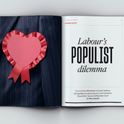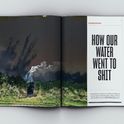Going it alone?
Anatol Lieven is to be congratulated on having brought out so clearly and cogently that nation states and their actions (or inaction) are a crucial element in dealing with climate change; and also that nation states often focus on quite the wrong security challenges (“The nation and the planet,” May).
But he surely goes too far when he dismisses systems of international solidarity as “utopianism” and “fantasy.” That is to fall into the trap of juxtaposing national and multilateral action as deadly enemies—the Trumpian heresy. We need both. After all, every well-governed, democratic nation state has within it systems for ensuring that burdens are equitably shared and that resources are allocated in such a way as to assist the least well-off. The world is no different.
If we can emerge from the current pandemic with a better understanding of how to combine national and collective action in an effective way, particularly in combatting climate change, then some good will have come out of it. That, after all, was the basis on which the UN, the EU, the WTO, Nato and many other international organisations were originally founded.
David Hannay was UK ambassador to the UN and EU
We will certainly recover
As John Kay and Mervyn King’s analysis demonstrates (“Into the unknown,” May) our responses to the knowns and unknowns associated with unexpected events are clouded by misunderstandings of the differences between risk, probability and uncertainty. But there is one further level of error that has been shown up by recent events. In times of uncertainty we tend to think that everything is uncertain and as a result to fear the worst. There is a tendency to forget what we do know.
For example, Covid-19 has sharply reduced oil demand. With supply already strong, prices fell by 50 per cent in mid-March. But the fall exaggerated the true impact. If, God forbid, the virus kills a million people, the world’s population at the end of December 2020 will still be around 85m higher than it was on 31st December 2019. Most of those people will have the resources to buy commercial energy supplies. At some point the pandemic will end and people will return to work and will once again be free to drive and to fly. The same is true for most other aspects of economic life.
These assertions are not certainties, but they carry very high probability. Covid-19 is a dreadful, disruptive event. But it is not the end of the world. In a time of much genuine uncertainty we should not allow exaggerated fears to make a difficult situation worse. Nick Butler, FT commentator and chair of the Policy Institute at King’s College London
Banknotes
Adair Turner and Paul Tucker’s debate about central banks’ impotence today (“The Duel,” May) skirted around a simple point. In very disruptive circumstances such as the financial crisis or today’s economic stop, what matters is that policymakers work together—the central bank alone could not support employees through this year, nor could the Treasury sustain liquidity in the markets.
The truth is that in the 1990s and early 2000s, the happy days of more modest economic cycles, central banks were given far too much credit for relatively successful economic times.
But as well as questions about humility, the debate raises some interesting questions about credibility—when I asked an audience of economists recently if a central bank that believed it had run out of effective policy should admit it, the majority said no. So much for transparency.
Kate Barker, former member of the Bank of England’s Monetary Policy Committee
An executive-minded ethos
David Allen Green has written a perceptive piece on the aptly nicknamed Executive Power Project (EPP) at Policy Exchange, with which I largely agree ("At law, April). I would however offer three variations on it.
The first is that the Human Rights Act has had more impact than the article suggests. Empirical studies demonstrate that it significantly increased the quantity and success of human rights appeals to the higher courts. Such cases have led to incremental change for the benefit of marginalised groups.
Second, Green says critics of the courts do not provide specific examples of judicial activism. But the EPP does regularly give examples of “problematic” cases, and in fact has published a list of 50. The more relevant point is that this list is shoddy, dismissed by most scholars I know, and clearly refuted in print by Paul Craig at Oxford.
And last, more attention should have been given to the EPP’s consistent advocacy of the sublimation of parliament during and prior to the prorogation saga. This is when its executive-minded ethos was most notably evident.
Jeff King, professor of law, University College London
Moore’s proof
I’m not sure that GE Moore has been so roundly forgotten as Ray Monk suggests (“The God that paled,” May). It is probably true that there is now little serious interest in Principia Ethica. The same, though, can’t be said for Moore’s proof of an external world, an anti-sceptical argument briefly touched on by Monk, which runs: here are two hands; if here are two hands, then there is an external world; so there is an external world.
Though most philosophers agree there is something wrong with the argument, they are not at all agreed about precisely what. We would seem to have a high level of justification for believing the premises; and the form of the argument is standard to logicians: “if P then Q; P; therefore Q.”
It has seemed to many philosophers, nevertheless, that the argument somehow fails to carry any conviction. The question of why has occasioned fascinating discussion; moreover, the argument has present-day defenders. So Moore hangs on. Indeed, it may be that it is Wittgenstein, Monk’s biographical subject, who is in greater danger of being ignored.
Helen Steward, President of the Aristotelian Society
How to pay for the “war”
Robert Skidelsky’s elegant exposition (“How war economies work,” May) concentrates on the short-term effects of the huge fiscal stimulus promised in response to the Covid-19 crisis. The exact eventual size of the package of measures, in the UK or elsewhere, is unknown and unknowable, just as in 1914 or 1939 or at the beginning of any war.
That’s why it is crucial to secure public assent now for the principles that will guide the long-term response. We cannot have any repetition of the deflationary return to the Gold Standard in the 1920s that Keynes described in The Economic Consequences of Mr Churchill. The overriding principle of “we’re all in this together” requires that the cost of public services like the NHS, together with wage subsidies, is spread out over time and also falls on those most able to pay, through higher rates of progressive taxation than we have grown used to. “Nothing on the income tax” must bite the dust.
Roderick Floud, economic historian
Ignorance is bliss
I was heartened by Peter Singer’s refusal to be embarrassed by the books he hasn’t read (“Brief Encounter,” May). “There are more good books than anyone can read” is so obviously true that it is incredible there is such a thing as literature shame. Many years ago I wanted to start a series in The Philosophers’ Magazine in which philosophers would own up to the most important work in the canon they hadn’t read. I wrote to a number of people who were usually responsive and friendly. Only one replied, protesting that the very idea of a confession was “self-indulgent.” Singer may be “not so easily embarrassed” but most of his colleagues are.
Julian Baggini, philosopher
Present vigilance
In his excellent article (“Opinions,” May) Kenneth O Morgan rightly says that governments that allot themselves extra powers seldom give them up, the 1911 Official Secrets Act being a case in point. During the Second World War Churchill rightly stressed the need to restrict our freedom to preserve our safety. But when it came to Regulation 18B, which conferred the abnormal power of arbitrary detention, itself the foundation of dictatorship, he insisted that it should be subject to the scrutiny and control of the House of Commons.
Boris Johnson is less scrupulous than his hero, acting ultra vires to prorogue parliament illegally. To combat coronavirus he possesses unprecedented powers and there is nothing to check the executive save public opinion. Thus the price of future liberty is present vigilance.
Piers Brendon, former keeper of the Churchill Archives centre
Dust to dust
Rachel Shabi’s reflection that “even secularists may find comfort in the tradition of religious rituals” is timely (“Opinions,” May). Rituals around death have changed distractingly in recent decades.
Fifty years ago a set funeral, arranged according to religious affiliation even for those with no noticeable beliefs, was near universal. Professionally conducted, it did not require any creative efforts from the family and thus left them free to grieve. Unless the deceased was very distinguished, it was not an occasion for recounting achievements—still less an opportunity to display grandchildren’s poetry-reading or violin-playing.
A funeral is the solemn transformation of a loved body into something to be disposed of. The modern notion that the occasion should be a “celebration” of a life seems too often based on a squeamish reluctance to accept the reality. The “ashes to ashes, dust to dust” moment, when the coffin should slide away, is regularly omitted. Instead, proceedings are “lightened” with funny stories from old school friends or favourite songs.
Perhaps the bleak, immediate-family-only funerals that coronavirus has imposed on us will cause a useful rethink.
Gillian Tindall, writer and historian
A bad trade
Sam Lowe is right that the Labour Party shouldn’t oppose an open trading system (“Why Keir Starmer must revamp Labour’s trade strategy,” website, April). But he’s wrong to suggest that it should endorse the current direction of trade policy.
Trade deals today go well beyond tariffs, including issues like food standards, medicine prices and the regulation of foreign investment. They take issues which should be decided through democratic debate and make them subject to secret negotiation, with big business accorded huge influence.
The resulting rules favour deregulation and liberalisation. For many, this means lower standards, worse pay, less protection, more inequality. That’s why nationalists like Donald Trump have used public disquiet over trade deals to build support.
If we want a rules-based international system we need to fundamentally redesign that system. An open trading regime must allow governments the ability to constrain corporations, redistribute wealth, protect welfare, improve standards—or it will fail. The only way to have an open trading system is to radically reform the rules it is based upon.
Nick Dearden, Director, Global Justice Now
In fact: 7th May marks the end of the five-year term David Cameron won in the 2015 general election. An estimated 10 quintillion (10 to the 31st power) individual viruses exist on our planet—enough to assign one to every star in the universe 100 million times over. National Geographic, 15th April 2020 In April, Bob Dylan scored his first ever US No 1 song as a performer, with the 17-minute long track “Murder Most Foul.” Pitchfork, 8th April 2020 Irish racehorse Galileo commands the world’s highest stud fee at $650,000; a gallon of his semen would be worth $49m, making it the world’s most expensive liquid. Business Insider, 14th April 2020 The average age of a car in Britain is eight years old. In Europe, only Luxembourg has a newer vehicle fleet (6.4 years old). Motoring Research, 23rd March 2020 Between 2000 and 2015, at least 207,459 minors were married in the US; 87 per cent were girls. Three US states granted marriage licences to 12 year olds. Independent, 16th April 2020 In the film Frozen, the characters Hans, Kristoff, Anna and Sven are named after Hans Christian Andersen, the author of the film’s source material The Snow Queen. @qikipedia, 4th April 2020
In fact: 7th May marks the end of the five-year term David Cameron won in the 2015 general election. An estimated 10 quintillion (10 to the 31st power) individual viruses exist on our planet—enough to assign one to every star in the universe 100 million times over. National Geographic, 15th April 2020 In April, Bob Dylan scored his first ever US No 1 song as a performer, with the 17-minute long track “Murder Most Foul.” Pitchfork, 8th April 2020 Irish racehorse Galileo commands the world’s highest stud fee at $650,000; a gallon of his semen would be worth $49m, making it the world’s most expensive liquid. Business Insider, 14th April 2020 The average age of a car in Britain is eight years old. In Europe, only Luxembourg has a newer vehicle fleet (6.4 years old). Motoring Research, 23rd March 2020 Between 2000 and 2015, at least 207,459 minors were married in the US; 87 per cent were girls. Three US states granted marriage licences to 12 year olds. Independent, 16th April 2020 In the film Frozen, the characters Hans, Kristoff, Anna and Sven are named after Hans Christian Andersen, the author of the film’s source material The Snow Queen. @qikipedia, 4th April 2020












